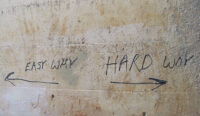The Easy Way Or The Hard Way
No trip to Hawaii is complete without visiting Diamondhead or Le’ahi. Diamondhead was formed years ago during an explosive volcanic eruption. The US Army built the trail to the summit in 1908 as part of Oahu’s coastal defense system. The three-quarter mile hike to the 751’ summit of Diamondhead is physically challenging. There are steep slopes, sharp narrow turns, switchbacks, tunnels, and stairs one must negotiate on the way to the top. In places where the terrain is too steep, the Army Engineers built concrete stairs. At one juncture, the hiker can go to the left and continue the switchback pattern to the top or they can traverse some very steep stairs, which is a shorter route to the top. Years ago, at this spot, someone drew left and right arrows and underneath them wrote: the easy way, to the left, or the hard way, to the right and climb the steep 99 steps.
Climbing Diamondhead is like navigating around all the obstacles and challenges of life. Something incessantly faced us with opportunities and choices to which path to follow—the easy way or the hard way? Jesus spoke of two paths when he said, “Strive to enter through the narrow gate, for many, I say to you, will seek to enter and will not be able… Enter by the narrow gate; for wide is the gate and broad is the way that leads to destruction, and there are many who go in by it (Luke 13:24 & Matthew 7:13).
You can always find Jesus on the high narrow road. However, he cautions his disciples that the road has many obstacles and is difficult to travel. One man came to Jesus and said; “Lord, I will follow you wherever you go. Jesus said unto him, Foxes have holes, and birds of the air have nests; but the Son of man hath not where to lay his head.” To another Jesus said; “Follow me. But he said, Lord, allow me first to go and bury my father. Jesus said unto him, Let the dead bury their dead: but you go and preach the kingdom of God.” Another man sad; “Lord, I will follow thee; but let me first go bid them farewell, which are at home at my house.” And Jesus said to him, No one, having put their hand to the plow, and looking back, is fit for the kingdom of God,” (Luke 9:57-62). The call of Christ is an invitation to a life of continual sacrifice.
To amplify this thought, Paul wrote: “I appeal to you therefore, brethren, by the mercies of God, to present your bodies as a living sacrifice, holy and acceptable to God, which is your spiritual worship. Do what is the good and acceptable and perfect will of God,” (Romans 12:1-2). Again the word, “sacrifice” is used to describe walking on the “Kings Highway.” Moreover Christians are non-conformists! Just because “everyone is doing it” doesn’t mean we should do it.
There are very few crafts, trades, or professions where the temptation to “cheat to get ahead” cannot be found! My earliest recollection of being told not to cheat was in second grade when we were taking a test. The teacher told us not to look at each other’s papers but to do our own work. I recall building a little fort with books on top of my desk to keep prying eyes at bay. As we progressed through school, they constantly reminded us not to cheat; and as we matured, we understood why we shouldn’t cheat.
Cheating to get ahead is not a twentieth-century phenomenon. History is awash with stories of men cheating, backstabbing, and using all kinds of skullduggery to get ahead. Even the ancient Greek Olympics were no exception. Controversy and allegations of cheating often circulated around the outcome of the games.
The first recorded publicly disgraced cheater was Eupholus of Thessaly. In 388 B.C., he bribed three boxers to “take a dive.” He was fined, and the money was used to erect a statue of Zeus outside the stadium to both appease the gods and to warn others who might also be tempted to cheat. Sadly, as time went on, there was a line of these statues, called “zanes.” Each statue bore a detailed description of the cheating offense. The apostle Paul was mindful of this cheating when writing about how a Christian should walk and wrote: And also, if anyone competes in athletics, he is not crowned unless he competes according to the rules (2Ti 2:5). Even the Christian is to walk honestly and in obedience to God (the rules).
There are as many ways to cheat to win as there are days in the year. Winning or succeeding, for some people, means winning at any cost, even if it means cheating. For people who travel the low road, the truth is simple—they know they cheated, and God knows they cheated. They know their victory rings hollow. Christianity isn’t spared by cheating. Jesus knew some people would try to take the easy road to heaven and told the crowd; “Truly, truly, I say to you, he who does not enter the sheepfold by the door but climbs in by another way, that man is a thief and a robber” (John 10:1).
Jesus forewarned his followers not to travel down the crooked road to ruin. He said don’t look for shortcuts to God. Stay on the straight and narrow and avoid the wide gate and broad way to destruction. The right road’s destination is eternal life: and the other destination is ruin and destruction. The question is, do you know which road you are on?
Blessings—

© 2023 Curtis Bond

